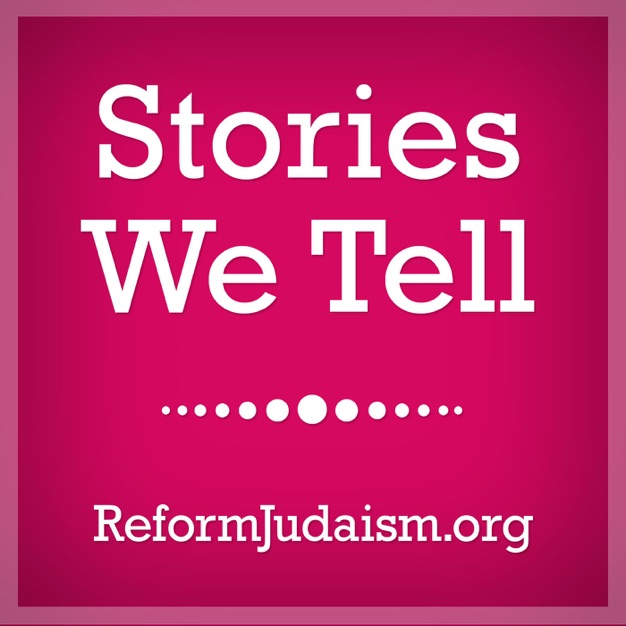
Stories We Tell
Union for Reform Judaism
Judaism has a deep and rich tradition of storytelling, of passing down stories from one generation to the next. To carry on that tradition, Stories We Tell, from ReformJudaism.org, will share a new story with you every Thursday. Whether you listen while driving to work, preparing Shabbat dinner, or taking your kids to school, each episode will give you a new story to reflect on and discuss with the people in your life.
- 5 minutes 55 secondsHow Are We Better?
For three years, this podcast has brought you a new episode nearly every single week, adding up to more than 160 stories designed to bring a little bit of joy and wisdom into your lives. For now, we're taking a little break – but Rabbi Leora Kaye has one final story to share.
Want more Jewish content while we're on pause? There are lots of ways to access everything ReformJudaism.org has to offer. Visit us online at ReformJudaism.org, subscribe to our email newsletters, and follow us on Twitter, Instagram, and Facebook. We look forward to hearing from you!
2 July 2020, 9:30 am - 5 minutes 20 secondsGod's Miracle
After 40 years in the desert, the Israelites reached the Land of Canaan. When they got there, they saw wheat and trees and fruit—things they had never seen before after spending their lives in the desert. But one woman remembers her mother describing plants and how they grow, so how does she explain it to her daughter? Cantor Rosalie Will retells the story. For a written version of the story, see “Gods Miracles” by Rabbi Edward H. Garsek in Three Times Chai: 54 Rabbis Tell Their Favorite Stories edited by Laney Katz Becker.
25 June 2020, 9:30 am - 5 minutes 46 secondsThe Sultan's Horns
The sultan hated getting haircuts because of his big secret: He had horns on top of his head! He was so afraid that people would find out that he threw every barber who cut his hair in prison. Finally, the only barber left in town was summoned to the sultan. Would he be thrown in prison like the barbers before him? Rabbi Mark Kaiserman retells the story. For a written version, see The Sultan’s Horns in “The Jewish Story Finder” by Sharon Barcan Elswit.
18 June 2020, 9:30 am - 4 minutes 55 secondsA Crack in the Water Bucket
Back in the days before indoor plumbing, water carriers would bring water to those who needed it. One water carrier carried the same two buckets each day, and even though one of them had a leak, he never seemed to do anything about it. The reason why teaches an important lesson about finding blessings, even when things may seem broken. Cantor Ellen Dreskin tells the story.
11 June 2020, 9:30 am - 8 minutes 43 secondsThe Old Torah
How important is the history of your family? Maybe you have a family ledger or an old book that carries the events, wisdom, and dreams of those who have passed on. This week, author and puppeteer Marilyn Price tells a story about such a book in “The Old Torah” and shows just how priceless our families’ stories truly are.
4 June 2020, 9:30 am - 4 minutes 13 secondsThe Spoonful of Oil
There was a young man who wanted to learn the secret of happiness. He sought out the advice of a wise man, who was too busy to talk with him at that moment but gave him a task: walk around and carry a spoon with two drops of oil and be careful to not let them spill. Listen to find out how this seemingly strange assignment taught the boy an important lesson.
28 May 2020, 9:30 am - 9 minutes 23 secondsThe Eagle Who Thought She was a Chicken
Who determines who you are? Is it the environment in which you’re raised, or is it what’s been inside of you your whole life? This week, we hear a story from Rabbi Rachel Greengrass of Temple Beth Am (Pinecrest, FL) about an eagle who thought she was a chicken, which asks us to think to when we had to determine who we truly are.
21 May 2020, 9:30 am - 4 minutes 49 secondsA Blank Letter
Is there someone in your life with whom you can share a thousand words without saying anything at all? Has there been a time, maybe in recent weeks, when all you needed was someone to just “be there” for you, or when someone needed you to just “be there” for them? This week, we hear a story from Rabbi Sari Laufer, director of congregational engagement at Stephen Wise Temple (Los Angeles, CA) about two friends separated by distance but closely connected in ways only they can understand.
14 May 2020, 9:30 am - 9 minutes 6 secondsGrandma’s ChallahFood is such an important part of Jewish history and culture, and for many of us, there’s nothing quite like the food our grandparents made for us as children. This week, author and puppeteer Marilyn Price tells the story of a king who wants nothing more than to taste the challah his grandmother used to make for him, and how something as simple as love can turn great food into something even better. To learn more about Marilyn, her puppetry, and her storytelling, you can visit her website at www.marilynprice.com.7 May 2020, 9:30 am
- 4 minutes 15 secondsTwo Frogs and a Little Encouragement
Has there ever been a moment when you wanted to give up on a goal because others said it was too hard? Has there ever been a moment when it seemed like all you could hear were cheers of encouragement to keep going? This week, we hear a story about two frogs who were in this exact same situation from Rabbi Rachel Greengrass of Temple Beth Am (Pinecrest, FL)
30 April 2020, 9:30 am - 3 minutes 8 secondsHow Do You Use It?
Have you ever had a great idea that wasn’t useful until you applied it? This week, join Rabbi Phyllis Sommer of Am Shalom in Glencoe, IL, as she tells the story of a rabbi and a soap maker who explore this idea and realize their professions have more in common than they might have thought.
23 April 2020, 9:30 am - More Episodes? Get the App
Your feedback is valuable to us. Should you encounter any bugs, glitches, lack of functionality or other problems, please email us on [email protected] or join Moon.FM Telegram Group where you can talk directly to the dev team who are happy to answer any queries.
 Can We Talk?
Can We Talk?
 On the Other Hand: Ten Minutes of Torah
On the Other Hand: Ten Minutes of Torah
 Judaism Unbound
Judaism Unbound
 Wholly Jewish
Wholly Jewish
 Pardes from Jerusalem
Pardes from Jerusalem
 Responsa Radio - Jewish Public Media
Responsa Radio - Jewish Public Media